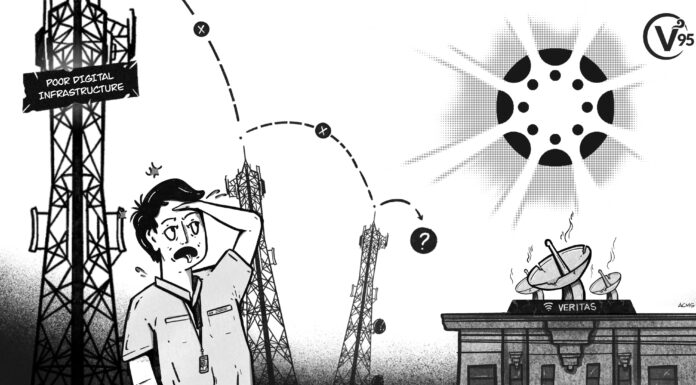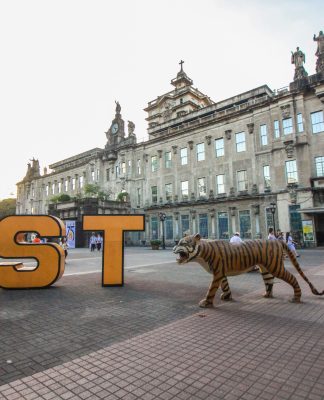Homily of the Very Rev. Rolando V. de la Rosa, OP, UST Rector Magnificus, in the Mass for Truth with former President Corazon Aquino and ZTE witness Rodolfo Lozada, at the UST Santissimo Rosario Church last March 2.
"If you look at something for the 100th time, you are in danger of seeing it for the first time." G.K. Chesterton wrote this enigmatic line to remind us that familiar things become strange when we look at these intently. The most ordinary thing can reveal an extraordinary significance that we can grasp only when we focus on it with attention. Perhaps this is the reason why we say: "Pay attention." Why not give, or share, or spare our attention? We say "pay attention" because attention is the price we pay in order to capture, even only in part, the superabundant meaning of reality.
Paying attention entails, not only the use of our eyes. Something monopolizes our attention when it captures our heart. That is why lovers say: "I only have eyes for you." In a very real sense, we only see those things that we want to see, and our way of seeing is determined, not so much by the clarity of our eyesight, but by the disposition of our heart. The way we see things reveal, not the way things are, but the way we are. A person with a clean heart will see beauty and peace around him. A person whose heart is clouded by suspicion and mistrust will see nothing but betrayal and deception. The roots of our eyes are in the heart.
In the first reading, God warned the prophet Samuel who was examining the candidates for the kingship of Israel: "Do not judge by his looks or by his stature. Yahweh does not judge as men judge. For human beings see with their eyes; Yahweh sees with the heart."
Despite the fact that David was barely a teenager, inexperienced and lacking in worldly wisdom, God chose him to rule over Israel. He saw something in David that made him fit to be a king. And even when he committed abominable sins that cried to heaven for justice, David remained "close to God’s heart." What did God see in David? It must be David’s humility. In moments of triumph, he would glorify God in songs and uninhibited dancing. In moments of defeat and utter failure, he would cry to God for mercy and pardon. Even when David was deserted by his army, cursed by his friends, and abandoned by his children, David had the humility to seek refuge in God. David had taught us this lesson: It is only in utter humility that we realize God is all we need because, after all, God is all we have.
The blind man in the Gospel who was healed by Jesus had the same human quality that David had. He was humble. St. Thomas Aquinas wrote that "humility is truth". Humility comes from the word "humus", which means soil or ground. A humble person has his feet set firmly on the ground of his being. A humble person accepts the truth about himself; he does not pretend to be somebody else. He does not wear a mask, unlike the Pharisees whom Jesus called "hypocrites" and "whitened sepulchers".
After he was healed, the blind man declared without equivocation: "I am the one". Take me for who I am: "This is me." When he was brought to the Pharisees, and was asked to testify about his healing, he simply stated the truth, without adornment or exaggeration. He said: "He put paste on my eyes, and I washed, and now I see." And when the Pharisees, the experts in the law subjected him to cross-examination, asking him: "What do you think of this man who opened your eyes?" His answer was straightforward: "He is a prophet."
It was his humility that made the truth of his statement unassailable. His humility also allowed him to see Jesus no longer as a man, or a healer, but as God. He exclaimed before the very human Jesus: "Lord, I believe." Not only did Jesus heal his blindness; he also led him to faith and conversion. From that moment on, he learned to see, no longer with his eyes, but with his heart. Like King David, the blind man had taught us a lesson: God chooses people to witness to the truth, not because they are blameless but because something has happened to them.
We can see the truth only if we first have it in our hearts. Let us offer this mass for ourselves: to make us humble, truthful, honest, like David and the blind man whose sight was restored. If there is one word that can contain these three qualities, the word would be INTEGRITY. The word comes from integer which means "whole". A person with integrity has a sense of wholeness or consistency within him. His thought is consistent with his words, which in turn are consistent with his actions. Truth must be true in all its part. A half-truth is a whole lie. We cannot be warriors of truth if we are not men and women of integrity.
It would be simplistic and hypocritical to say the problem of our country is the President and the men and women who are behind her. This is, a dangerous misunderstanding of the crisis we are facing today. The integrity crisis involves not just the President and the men and women behind her. The integrity crisis involves us all.-In the body of Christ, we belong to one another, we affect one another, and we cannot escape one another. St. Paul wrote: "If one member of the body suffers, all the members suffer with it; if one member is honored, all the members rejoice with it." Whether we like it or not, for better or for worse, we are all connected. Sin, even the most private, eventually destroys society.
The crisis of integrity involves us all. Who of us have a corner on virtue that we can say we have never lied to other people? Or worse, lied to ourselves? Jesus said: Do not judge. His command is not against making a true and righteous judgment. It asks us to beware, lest in our haste to judge others, we might be like the hypocrites: judging others as absolutely corrupt simply because we are blinded by our exaggerated piety and moral smugness.
It is easy to tell the truth; but the next easiest is to believe our own lie. , Self-deception is easy especially for people who know that the discovery of their bad deeds can be devastating to their self-image and sense of well-being. Self-deception is the most abominable species of lying. Why? Because a person can become so submerged in the intricate details and implications of the lie, that the continuation of the lie becomes second nature.
If we want to restore truth and integrity in society, government, and the churches, we must stop looking for scapegoats to ease our burden of guilt and failure. We seem to have a penchant for putting the blame on just one person or a group of persons in order to take the heat off ourselves. We tend to shift attention away from our inability to govern ourselves to our self-appointed role as a social critic and reformer.
Let’s face it. We delude ourselves if we think that by driving Gloria Arroyo away from Malacanang, as we did with Marcos and Erap, integrity and honesty will be restored. The two previous People Power events have not produced this desired result.
It is true, we can now boast of our democratic institutions. Last Thursday,; a successful Chinese businessman told me how fortunate we Filipinos are. "People in China are progressing by leaps and bounds" he said, "but they do not enjoy the freedom that Filipinos have." Ah, freedom. I muttered to myself: "We are so free, that’s why-we are so lost."
Democracy exists where reciprocal bonds, governed by truth and justice, link people to one another. Democracy exhibits the belief that human beings are capable of making correct judgments and responsible human decisions. But take a look at our elections. This process is supposed to be our most palpable way of manifesting to the world that we are indeed a democracy. But Gore Vidal’s criticism of the American election also applies to ours: "Our system of electing politicians to office is rotten and corrupted to its core, because organized money has long since replaced organized and enlightened public opinion. And most of it comes from rich people and -corporations, who now own our political process –lock, stock, and pork barrel."
Many present-day elected officials are mere surrogates of hidden power-brokers who, after election, take back what they had invested in. This deeply entrenched system of patronage easily lures honest officials into the despicable practice of graft and corruption.
If we want to restore integrity and honesty in government, the best way is not through a rigodon of leaders who are forcibly removed through People Power, but through an enlightened, educated, and conscientious electoral process. WE HAVE 26 MONTHS BEFORE THE NEXT ELECTION. We have enough time TO PREPARE OURSELVES SO WE CAN VOTE WISELY. Let us use People Power during election time, not only before or after. It has happened in the past, in Pampanga, in Isabela, and in other less known places in our country. We can make it happen again.
As early as now, schools, colleges, and universities, and conscientious government officials as well as churches, NGO’s, and the rest of civil society can adopt this as their advocacy going into 2010.
You may object: The present government leadership will not allow us to do that. Well, this happens only because our brand of democracy is obsessed with leadership. We idolize our government leaders and place our destinies in their hands. In truth, democracy will not work without conscientious constituents. We have to discard that model of democracy which portrays government leaders as the active molders, and we their constituents as the passive clay. Our task as voters is not only to elect our officials but to keep them in their proper place, which is to be our SERVANTS, not our lords and masters. We have to make them aware that they are accountable to us.
What our country needs at this crucial stage of our history are voters with an enlightened will, voters who will not elect officials who will treat them like doormats, citizens who will not exchange their conscience for convenience, nor their principles for monetary gain.
Bertrand Russell once wrote that democracy, the leader cannot be more stupid than his constituents. For, the more stupid he is, the more stupid still are his constituents for electing him.
People may again raise this objection: "The next election is still too far ahead. We have to settle this corruption mess immediately. We have to bring to the light those who are guilty right now." Indeed, we have to do that. But it seems that People power appears to be our way of saying: We want it bad and we want it now, not sooner or later, but NOW. We are obsessed with speed. We want everything quickly and instantaneously. Even our prayers are done in a fast forward mode to save time. We become impatient when we don’t get what we want. Don’t you notice? We are always in a hurry but always late. Life is not a matter of speed but depth. The faster we go through life, the shallower our understanding of it becomes. Quick successes usually are a fluke. Real and lasting victories take time.
Finally, why do we march for truth? What motivates us? Is it love for truth or are we simply furious at the people whom we want to punish? We must remember that prolonged and habitual anger can be very exhausting. Anger can turn even the most reasonable man into a fanatic. Fanatics are hopelessly one-sided. They are filled with an almost infallible certainty of their rectitude, and an equally infallible certainty of the iniquity of those whom they think are evil.
Unrequited anger festers into hatred. This is even more destructive because hatred makes it almost impossible for us to forgive. Contrary to what we think, forgiveness is not the prerogative of all. Not everyone can forgive. A cockroach cannot pardon a horse for trampling it to death. The power to forgive is correlative with the capacity to punish. We exercise our ability to forgive when, even if we have the right and the power to inflict punishment, we show the strength of will to control our desire to destroy and humiliate our opponent.
Gandhi once asked: "What is victory if it is measured by the gauge of destruction?" Victory does not consist in conquering the enemy, but in conquering ourselves. As he beautifully puts it: "Strength does not come from physical power, but from an indomitable will to control our desire to retaliate."
As we continue with this Eucharistic celebration, it is good to remember the beautiful lines of Maya Angelou:
History, despite its wrenching pain cannot be unlived.
And if faced with courage, need not be lived again … Hereon the pulse of this new day, you may have the grace to Look up and out;
And into your sister’s eyes, into your brother’s face, your country And say simply, very simply with hope: Good Morning.
Good morning. It means a good beginning. In humility, honesty, and integrity, let us ask God to make this beginning happen to us and in our country, through his unending grace. Amen.















